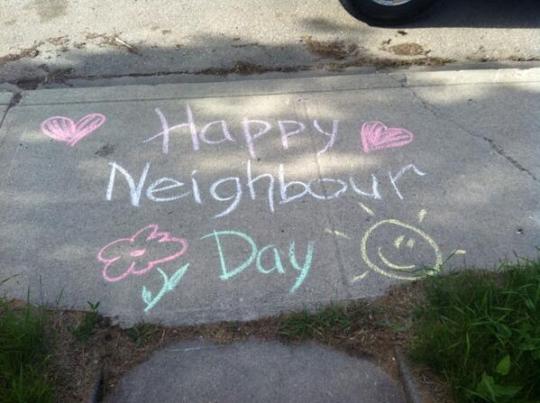Does Knowing Your Neighbours Make You Happier?
I am lucky to have good neighbours. On one side of my duplex there is a heritage home where two older men live. They love gardening, wine and hockey (they probably like other stuff but this is my limited knowledge based on small talk and observation).
In the two years that my husband and I have lived in our home, they have offered us hockey tickets, complemented my crappy guitar playing and let me steal lilac bunches from their tree that stretches into our backyard.
My other neighbours are the people we share a duplex with, who are a family with a teenage boy. The dad loves to reminisce about fatherhood whenever he sees my son, and they always take care of our cat, Bob, and water our plants when we are away.
If anything were to happen to my family or my home, I know I could ask these people for help and I have in the past. Having that security in my community makes me happy and I am not the only one who feels that way. Knowing your neighbours and feeling connected to your community is an essential part of the human condition.
A recent Statistics Canada study confirmed that there is a positive relationship between life satisfaction and individuals' feelings of belonging to their community and whether they know their neighbours. It echos what a growing body of research is finding: that wellbeing is higher amongst people who have regular contact with their neighbours, Even just saying hello can have a big impact on how secure and happy we feel about where we live.
Nobody is suggesting that you have to become best friends and have weekly barbeques with your neighbour. This can make it awkward if you need to address tricky situations like when your neighbour's cat craps in your yard or if he or she throws raging parties every Saturday night.
A study by the Vancouver Foundation found that 1 in 4 Vancouverites don't know their neighbours. It is worse for renters and people in high-rises. 39% of renters and 43% of people in high-rises do not know the first names of at least two of their neighbours. The study had other findings on neighbourhood connections in Vancouver:
Our neighbourhood connections are cordial, but weak. While most of us know the names of at least two of our neighbours, the connections typically stop there. Most of us do not do simple favours for our neighbours (like taking care of their mail when they are away) and fewer have visited a neighbour's home or invited a neighbour over.
The most often-cited reason for not knowing neighbours is that people seldom see each other. However, another significant reason seems to be indifference: we prefer to keep to ourselves, or have little interest in getting to know our neighbours.One-third of the people we surveyed do not know if their neighbours trust each other.
If we are to believe what the media focus on these days, we are more likely to call the cops on our neighbours over parenting decisions, or hire a loud rock band to get revenge on them, instead of actually talking to them directly. This is likely because, sadly, a lot of us don't bother getting to know our neighbours.
Vancouver is trying to address social isolation and lack of engagement with its Engaged City Task Force, which I have written about in the past. One of its strategies is to encourage communities to host block parties. While Vancouver has taken a more subdued approach, the City of Calgary, Alberta, has taken boosting neighbourly relations to the next level.
On June 20th, Calgary city hall is launching Neighbour Day to encourage Calgarians to host block parties, barbecues and other community events, as well as mark the second anniversary of the floods that severely damaged the city.
Mayor Naheed Nenshi launched the event last year to celebrate the volunteerism and community spirit that helped flood-ravaged districts recover from the 2013 disaster when the Bow and Elbow rivers overflowed their banks.
Over 40 communities participated and the event was so successful that a few weeks ago, its Council voted unanimously to declare the third Saturday of every June as Neighbour Day. Gearing up for this year's event, the city has a website where you can download posters, nametags and event planning tool kits. According to Mayor Nenshi:
"Neighbour Day is a time to think about what you want to do in your own community. Organize a fence painting. Maybe a community clean up. Maybe apply to close a street and have a block party. The possibilities are endless. The opportunity is great. It is a chance to get together with our neighbours and remember how powerful we are as a community."
Calgarians learned during a natural disaster that knowing our neighbours matters. Hopefully, Vancouverites don't need an earthquake to make us realize the same. It means more than borrowing eggs or picking up our mail. Neighbourhood connections makes us feel happier and more secure in our community.
See also: Urban Architecture and Building Better Communities




